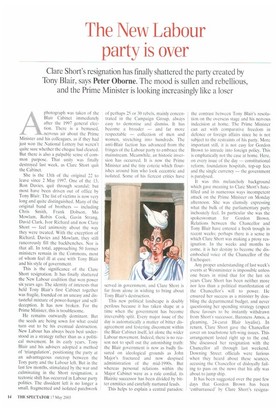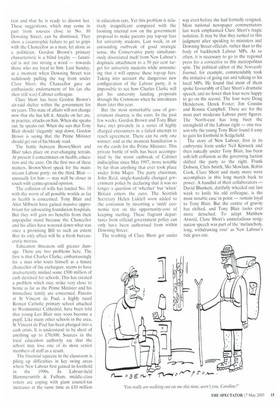The New Labour party is over
Clare Short's resignation has finally shattered the party created by Tony Blair, says Peter Oborne. The mood is sullen and rebellious, and the Prime Minister is looking increasingly like a loser Aphotograph was taken of the Blair Cabinet immediately after the 1997 general election. There is a bemused, nervous air about the Prime Minister and his colleagues, as if they had just won the National Lottery but weren't quite sure whether the cheque had cleared. But there is also a palpable sense of common purpose. That unity was finally destroyed last week, as Clare Short quit the Cabinet.
She is the 13th of the original 22 to leave since 2 May 1997. One of the 13, Ron Davies, quit through scandal: but most have been driven out of office by Tony Blair. The list of victims is now very long and quite distinguished, Many of the original band of brothers — including Chris Smith, Frank Dobson, Mo Mowlam, Robin Cook, Gavin Strang, David Clark, Ivor Richard and now Clare Short — feel animosity about the way they were treated. With the exception of Richard, Davies and Mowlam, they still rancorously fill the backbenches. Nor is that all. In total, approaching 50 former ministers remain in the Commons, most of whom feel ill at ease with Tony Blair and his style of government.
This is the significance of the Clare Short resignation. It has finally shattered the New Labour coalition that won power six years ago. The identity of interests that held Tony Blair's first Cabinet together was fragile, founded on an uneasy and distasteful mixture of power-hunger and selfdeception. It has now broken. For the Prime Minister, this is troublesome.
He remains outwardly dominant. But the seeds are being sown for what could turn out to be his eventual destruction. New Labour has always been best understood as a strategy rather than as a political movement. In its early years, Tony Blair and his advisers adopted a method of 'triangulation', positioning the party at an advantageous outcrop between the Tory party and the Labour left. But in the last few months, stimulated by the war and culminating in the Short resignation, a tectonic shift has occurred in Labour party politics. The dissident left is no longer a small, fragmented and isolated patchwork of perhaps 25 or 30 rebels, mainly concentrated in the Campaign Group, always easy to demonise and dismiss. It has become a broader — and far more respectable — collection of men and women, stretching into hundreds. The anti-Blair faction has advanced from the fringes of the Labour party to embrace the mainstream. Meanwhile, an historic inversion has occurred. It is now the Prime Minister and the tiny coterie which flourishes around him who look eccentric and isolated. Some of his fiercest critics have served in government, and Clare Short is far from alone in wishing to bring about Tony Blair's destruction.
This new political landscape is doubly perilous because it has taken shape at a time when the government has become irreversibly split. Every major issue of the day is automatically a matter of bitter disagreement and festering discontent within the Blair Cabinet itself, let alone the wider Labour movement. Indeed, there is no reason not to spell out the astonishing truth: the Blair government is now as badly fissured on ideological grounds as John Major's fractured and now despised administration of the mid-1990s. But whereas personal relations within the Major Cabinet were as a rule cordial, its Blairite successor has been divided by bitter enmities and carefully nurtured feuds.
This helps to explain a central paradox: the contrast between Tony Blair's resolution on the overseas stage and his nervous indecision at home. The Prime Minister can act with comparative freedom in defence or foreign affairs since he is not subject to the restraints of his party. More important still, it is not easy for Gordon Brown to intrude into foreign policy. This is emphatically not the case at home. Here, on every issue of the day — constitutional reform, foundation hospitals, top-up fees and the single currency — the government is paralysed.
It was this melancholy background which gave meaning to Clare Short's hatefilled and in numerous ways incompetent attack on the Prime Minister on Monday afternoon. She was clumsily expressing what the bulk of the parliamentary party inchoately feel. In particular she was the spokeswoman for Gordon Brown. Relations between the Chancellor and Tony Blair have entered a fresh trough in recent weeks; perhaps there is a sense in which Clare Short was making a proxy resignation. In the weeks and months to come, it is her destiny to become the disembodied voice of the Chancellor of the Exchequer.
Any proper understanding of last week's events at Westminster is impossible unless one bears in mind that for the last six years Clare Short has been neither more nor less than a political manifestation of the Chancellor's will to power. He ensured her success as a minister by doubling the departmental budget, and never questioning her spending strategy (expect these favours to be instantly withdrawn from Short's successor, Baroness Amos, a gleaming, 24-carat Blair loyalist). In return, Clare Short gave the Chancellor cover on touchstone left-wing issues. This arrangement lasted right up to the end. She discussed her resignation with the Chancellor all through last weekend. Downing Street officials were furious when they heard about these seances, accusing the Chancellor of disloyally failing to pass on the news that his ally was about to jump ship.
It has been suggested over the past few days that Gordon Brown has been 'embarrassed' by Clare Short's resigna tion and that he is ready to disown her. These suggestions, which may come in part from sources close to No. 10 Downing Street, can be dismissed. They show a catastrophic failure to get to grips with the Chancellor as a man, let alone as a politician. Gordon Brown's primary characteristic is a blind loyalty — fanatical is not too strong a word — towards those who are loyal to him. Last Sunday, at a moment when Downing Street was sedulously pulling the rug from under Clare Short, the Chancellor gave an enthusiastic endorsement of his (as she then still was) Cabinet colleague.
Clare Short has been Gordon Brown's air-raid shelter within the government for six years. This state of affairs will not change now that she has left it. Attacks on her are, in practice, attacks on him. When she speaks out, he speaks out. When she says that Tony Blair should 'elegantly' step down, Gordon Brown is saying that the Prime Minister should get out of his bloody road.
The battle between Brown/Short and Blair takes place on ever-changing terrain. At present it concentrates on health, education and the euro. On the first two of these matters. Brown/Short speak for the mainstream Labour party: on the third, Blair — unusually for him — may well be closer in touch with centre-ground opinion.
The collision of wills has landed No. 10 with the worst of all possible worlds as far as health is concerned. Tony Blair and Alan Milburn have gained massive opprobrium for advocating foundation hospitals. But they will gain no benefits from their unpopular stand because the Chancellor and his allies have watered down what was once a promising Bill to such an extent that its only effect will be a fresh bureaucratic morass.
Education threatens still greater damage. There are two problems here. The first is that Charles Clarke, embarrassingly for a man who touts himself as a future chancellor of the exchequer, seems to have inadvertently mislaid some £500 million of cash destined for schools. This has created a problem which may strike very close to home as far as the Prime Minister and his immediate family are concerned. Parents at St Vincent de Paul, a highly rated Roman Catholic primary school attached to Westminster Cathedral, have been told that young Leo Blair may soon become a pupil. Like many other schools in the area, St Vincent de Paul has been plunged into a cash crisis. It is understood to be short of anything up to £70,000. Sources in the local education authority say that the school may lose one of its most senior members of staff as a result.
The financial squeeze in the classroom is piling up difficulties in key swing areas where New Labour first gained its foothold in the 1990s. In Labour-held Hammersmith & Fulham, middle-class voters are coping with giant council-tax increases at the same time as £10 million in education cuts. Yet this problem is relatively insignificant compared with the looming internal row on the government proposal to make parents pay top-up fees for university students. Last week, in an astounding outbreak of good strategic sense, the Conservative party simultaneously dissociated itself from New Labour's dogmatic attachment to a 50 per cent target for university students while announcing that it will oppose these top-up fees. Taking into account the dangerous new configuration of the Labour party, it is impossible to see how Charles Clarke will get his university funding proposals through the Commons when he introduces them later this year.
But the most remarkable case of government disarray is the euro. In the past few weeks, Gordon Brown and Tony Blair have met privately in a series of highly charged encounters in a failed attempt to reach agreement. There can be only one winner: and at the moment humiliation is on the cards for the Prime Minister. This private battle of wills has been accompanied by the worst outbreak of Cabinet indiscipline since May 1997, more notable by far than anything that ever took place under John Major. The party chairman, John Reid, single-handedly changed government policy by declaring that it was no longer a question of 'whether' but 'when' Britain enters the euro. The Scottish Secretary Helen Liddell soon added to the confusion by inventing a 'sixth' economic test on the opportunity-cost of keeping sterling. These flagrant departures from official government policy can only have been authorised from within Downing Street.
The trashing of Clare Short got under
way even before she had formally resigned. Most national newspaper commentators last week emphasised Clare Short's tragic isolation. It may be that they rushed to this judgment after speaking to ministers and Downing Street officials, rather than to the body of backbench Labour MPs. As so often, it is necessary to go to the regional press for a corrective to this metropolitan spin. The political editor of the Newcastle Journal, for example, commendably took the initiative of going out and talking to his local MPs. He found that most of them spoke favourably of Clare Short's dramatic speech, and no fewer than four were happy to go on the record. The four were Doug Henderson, Derek Foster, Jim Cousins and Ronnie Campbell. These are for the most part moderate Labour party figures. The North-east has long been the stronghold of the Labour right — one reason why the young Tony Blair found it easy to gain his foothold in Sedgefield.
The story of New Labour, first in its embryonic form under Neil Kinnock and then nakedly under Tony Blair, has been soft-left collusion as the governing faction shifted the party to the right. Frank Dobson, Chris Smith, Mo Mowlam, Robin Cook, Clare Short and many more were accomplices in this long march back to power. A handful of their collaborators — David Blunkett, dutifully wheeled out last week to knife his old colleague, is the most notable case in point — remain loyal to Tony Blair. But the centre of gravity has shifted, and Tony Blair looks ever more detached. To adapt Matthew Arnold, Clare Short's unmelodious resignation speech was part of the 'melancholy, long, withdrawing roar' as New Labour's tide goes out.



































































































 Previous page
Previous page